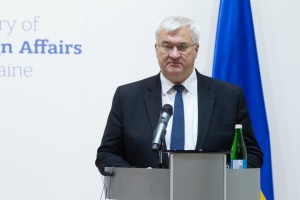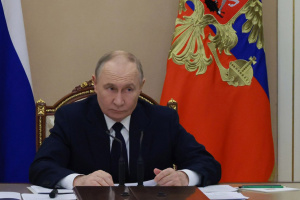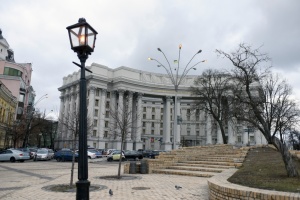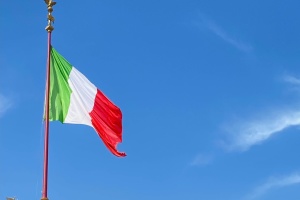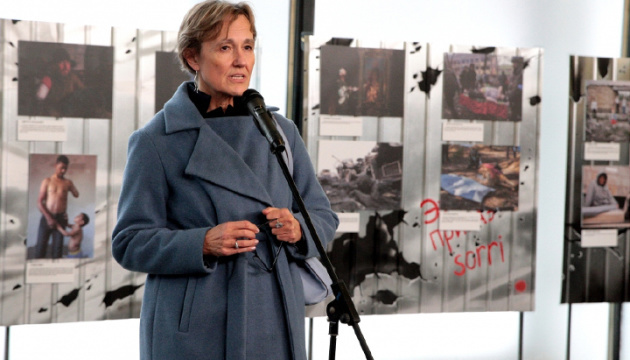
300 days of war as seen by foreign friends
As Russia's full-scale invasion of Ukraine enters its 300th day, Ukrinform asked three questions to foreign diplomats working in our country:
1. How did you and your embassy team get through these 300 days of war in Ukraine?
2. What assistance from your country in resisting Russian aggression do you consider to be the most significant?
3. What are new opportunities for cooperation between Ukraine and your country in order to achieve the fastest possible victory over the terrorist state of Russia?
It follows from the diplomats' answers that their life in the wartime Ukrainian capital is not much different from ours - foreign ambassadors and their colleagues, just like all of us, wait out Russian missile attacks in shelters, stock up on water and fuel and consider working in conditions of a long blackout. However, despite this, they also believe in Ukraine's victory and do all they can to bring it closer.
According to the ambassadors, they are inspired by the resilience of Ukrainians, and we, in turn, should be inspired and supported by the fact that in these very difficult times we have true friends. And as we can see, it is easier to beat an aggressor together.
Ambassador of the Republic of Lithuania to Ukraine Valdemaras Sarapinas:
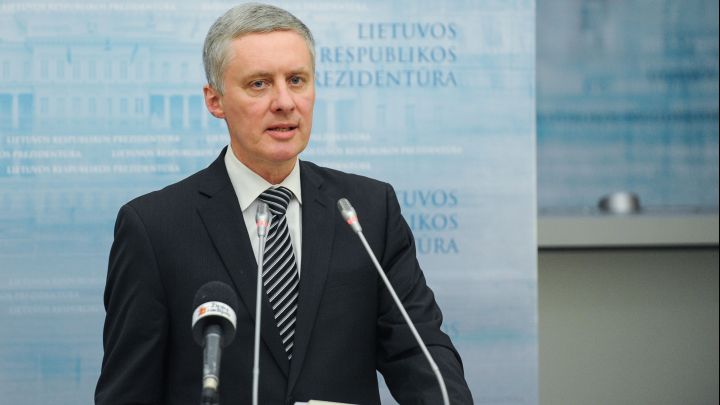
Photo: Paulius Peleckis
NOBODY CAN GRANT A DIPLOMATIC IMMUNITY FROM RUSSIAN MISSILES
1. I am very pleased to note that the Lithuanian Embassy kept operating and providing consular services in Ukraine despite the war. Lithuanian ambassador was the first one, who returned officially to Kyiv (from Lviv). At present, all key Embassy personnel is back in Kyiv and we will be doing our utmost to bring Ukraine’s victory closer.
At the same time, foreign embassies are exposed to the very same challenges as the citizens of Kyiv. Nobody can grant a diplomatic immunity from Russian missiles or the resulting power or water cutoffs. Therefore, in our daily activities we follow security recommendations of the Ukrainian authorities, we have reviewed our personnel safety procedures, and have stocked essentials like water and fuel to endure longer disruptions of critical services.
2. It is hard to single out one or two elements when so much political and practical support is flowing Ukraine’s way. Inevitably, at the time of war, military aid to Ukraine’s heroic Armed Forces stands out as the most vital. Since the beginning of the russian aggression, Lithuanian military has dug deep into its reserves to assist their Ukrainian brothers. The assistance included critically important air defence systems, artillery and armoured vehicles. In addition, our volunteer organisations like “Blue Yellow,” “Šaulių Sąjunga,” “LDK Palikuonys” and others have scoured the world to buy drones, vehicles and, more recently, generators and winter clothing for the ZSU. Then there are countless examples of Lithuanian nationals coming to support Ukraine’s fight either as part of the “International Legion” or with humanitarian assistance missions.
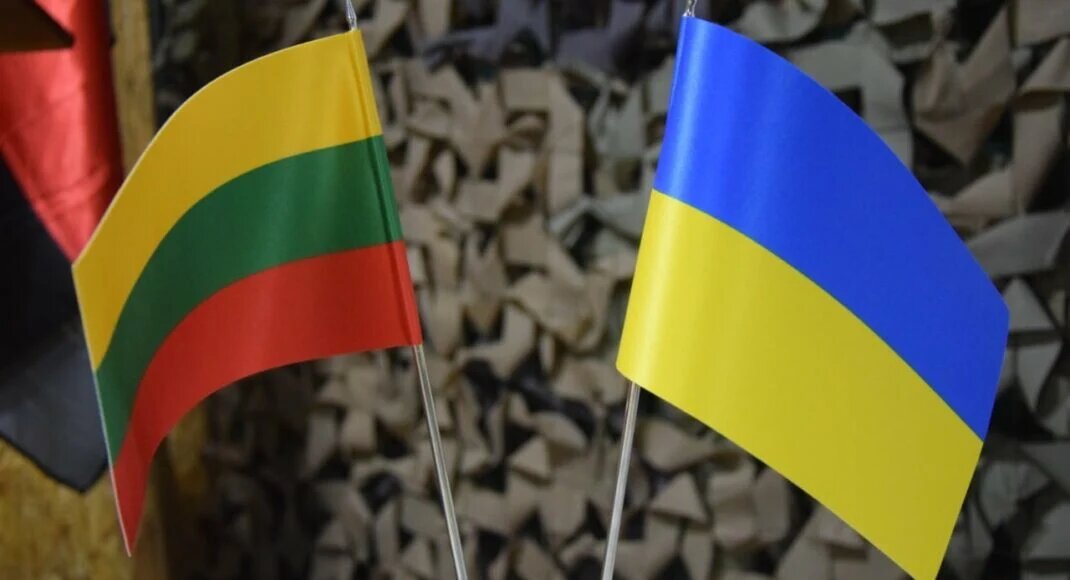
Remarkably, there is no sense of fatigue within Lithuania of supporting Ukraine. Just a couple of weeks ago, another Lithuanian NGO - “Laisvės TV” - has raised substantial funds to buy naval drones for the Ukrainian Navy, while the Lithuanian Government and business community have joined efforts to assist the restoration of Ukraine’s energy infrastructure, which has been damaged by Russia’s missiles.
3. The road to victory, in my view, lies in the unity of effort between Ukraine and its Western allies. In particular, we need to focus on three key areas:
Firstly, we need to make sure that Ukrainian military has the means to drive the russian forces out from Ukraine. As the stocks in the West have been significantly diminished during the first year of war, our military industry will have to accelerate the production of armaments and munitions for Ukraine. Also, additional maintenance facilities will be needed to service the equipment, which has already been provided to the ZSU.
Secondly, the Western countries will have to keep providing Ukraine with financial assistance for proper functioning of the state at the time of full-scale war. These are non-trivial amounts but they are incomparable with the costs that Ukrainians are paying in fighting russian aggressors.
Thirdly, the EU will need to pay particular attention to the enforcement of sanctions imposed on russia and belarus. We know that russia is actively working to get access to the critical components in the West.
Needless to say, Ukraine will be able count on Lithuania’s most active support in all these (and many other) areas.
Bartosz Cichocki, Ambassador of Poland to Ukraine:
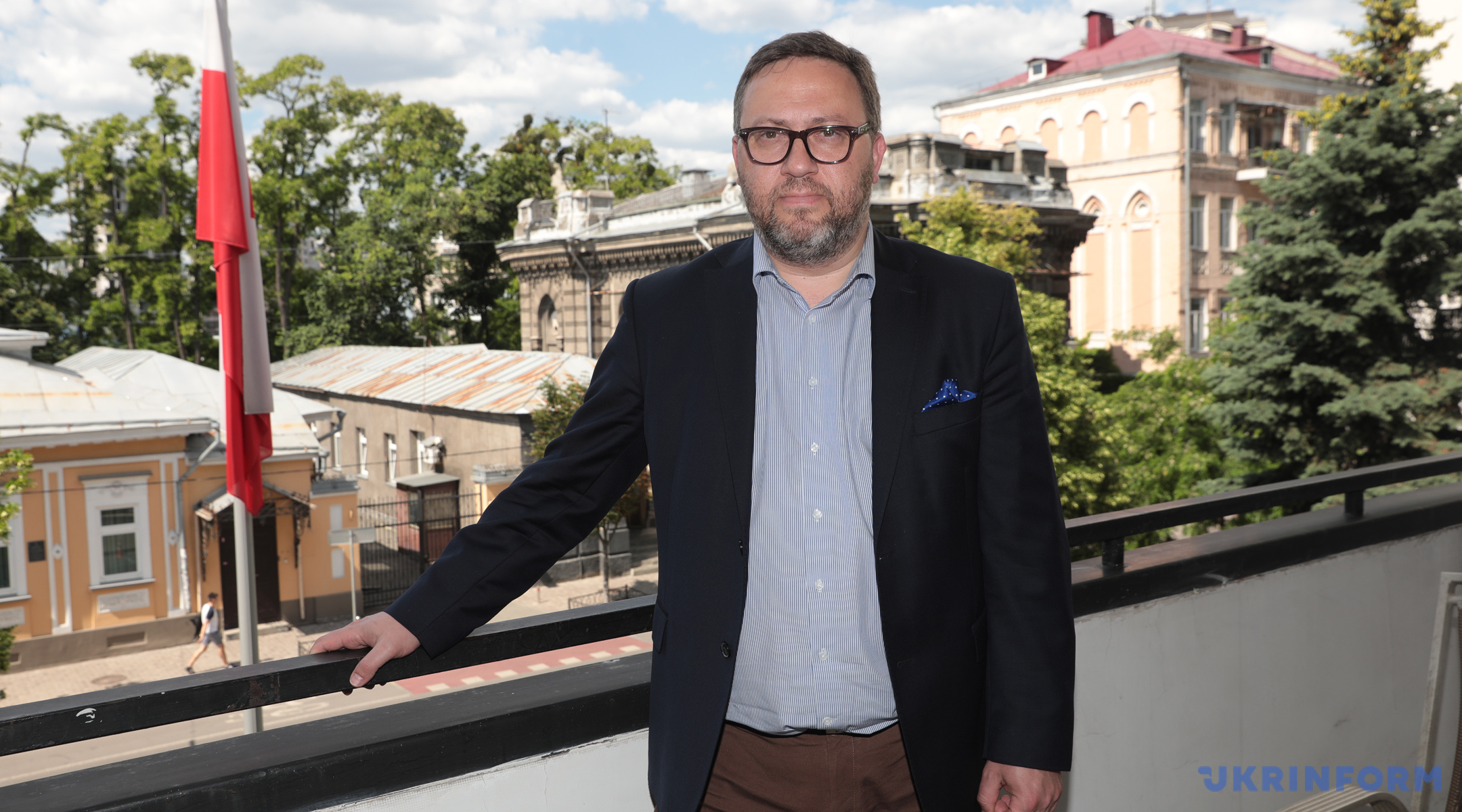
THE GREAT EVIL THAT RUSSIANS BROUGHT WITH THEMSELVES HAS PROVOKED EVEN MORE GOOD
1. It was probably the most stressful period of our work. We were prepared for the course of events thanks to information from Warsaw and from our allies. The visits to Ukraine by President of the Republic of Poland Andrzej Duda, Prime Minister Mateusz Morawiecki and Minister of Foreign Affairs Zbigniew Rau were of great importance in February. Each of such visits delivered a clear message: we will stand alongside Ukrainians to the end.
We also realized from the very beginning that this is a war that determines our sovereignty and security. We were and are here not only for you, but also so that Russian aggression does not threaten our families in Poland. The embassy was prepared to work in the extreme conditions caused by the Russian aggression on February 24, in terms of food, fuel, water, etc. We were supported by the National Guard and the Ministry of Defense of Ukraine, who were helping us a lot, in particular in terms of evacuating a large number of personnel to Poland.
During these 300 days of the full-scale war, neither I nor anyone from my team, not for a minute, doubted the victory of Ukraine. This persuasion and belief that together with you, Ukrainian friends, we can wait for the day of victory supported both me and the Polish diplomatic staff in Kyiv.
In the war, days pass very quickly, we struggle with difficulties every day, we serve far from our families. Our work is different from what we did before February 24. Now we are more focused on providing aid, we have direct contact with people who have suffered from Russian terror. The opportunity to provide help on the spot and the honor of being a representative of the state and the people, who during the war opened up to the plight of their neighbors, compensates for all the inconveniences.
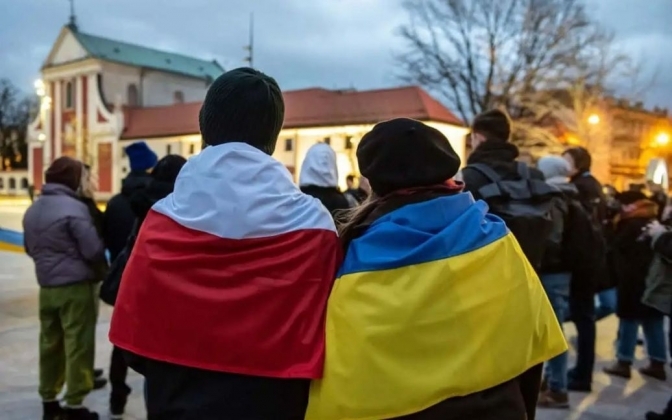
2. It is difficult to name one category of aid: at first, it was most important to open border checkpoints for refugees and organize a military center in Rzeszów, thanks to which we were able to quickly replenish the shortage in ammunition of the Armed Forces of Ukraine. When Russians destroyed fuel depots in Ukraine, the most important thing was the supply of gasoline and diesel fuel. Now, I believe the most important thing is the supply of equipment for power plants and grids.
We are constantly delivering hundreds of tonnes of food, medicine and equipment to hospitals. A few months ago, the Chancellery of the Prime Minister launched a program for the transportation of the injured military and civilians from Ukraine to Polish hospitals. The team of Prime Minister Morawiecki also created a network of modular towns for internally displaced persons in Ukraine – currently, they can accommodate more than 5,000 people.
Specially, I would also like to note a large number of Polish volunteers who, on their own, help those in need in Ukraine or provide shelter to Ukrainians in Poland.
3. Cooperation between our Armed Forces and defense industries is a priority. Poland is a training rear – in particular, as the European Union Assistance Mission Ukraine (EUMAM) was established – and a maintenance rear for the Armed Forces of Ukraine. I am convinced that, in the coming years, unprecedented Polish-Ukrainian projects will be developed on this basis, both in the field of defense and defense industry.
Poland has also become a business and industrial rear for Ukraine. Several thousand companies were forced to temporarily relocate their activities outside Ukraine.
My wife has recently written to me that restaurants and beauty salons, which were well known to her from Kyiv, have opened in Warsaw. In the field of trade and production, a new quality of relations between Poles and Ukrainians is being established, which will bear fruit in the future – at the key moment of state reconstruction for Ukraine. The same goes for healthcare, education and culture.
The great evil that Russians brought with themselves has provoked even more good. Hence, I have no doubt about the ultimate success of Ukraine and Poland.
U.S. Ambassador to Ukraine Bridget Brink:
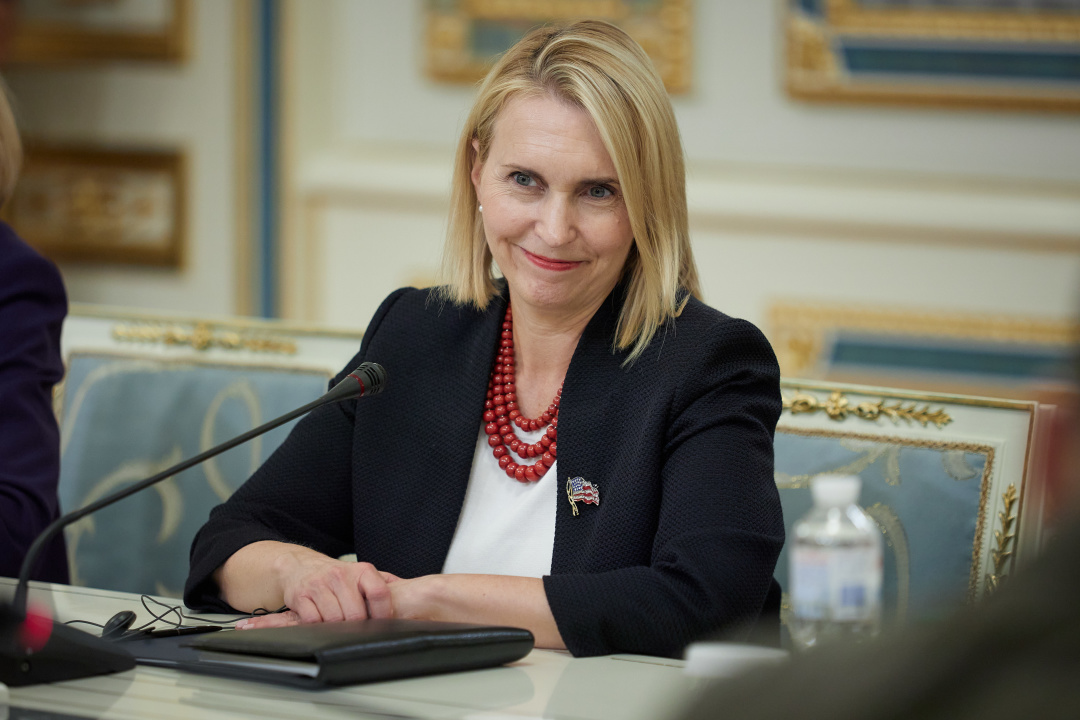
Bridget Brink
WE SEE THE RESULTS OF U.S. SECURITY ASSISTANCE TO UKRAINE ON THE BATTLEFIELD
1. I am so proud of my team here at the Embassy. We are focused on the tremendously important job at hand because we know how important it is to Ukraine, to the United States, and to the world. And we are inspired by the incredible courage and resilience of the Ukrainian people.
The U.S. Embassy has a team of Americans and Ukrainians who work side-by-side around the clock because we know it is imperative that Ukraine prevail in its fight for sovereignty, freedom, and democracy. This is a fight not just for Ukrainian territory and sovereignty, but for our shared values, for a safer world in which might does not make right, and for Ukraine’s very existence.
As President Biden has said repeatedly, the United States will stand with Ukraine as long as it takes. In Washington, across the world, and here in Kyiv, we are committed to making good on the President’s commitment. We stand shoulder-to-shoulder with Ukraine and with our allies and partners against Russia’s unprovoked aggression and its barbaric strategy to bring this war into every home across the country by deliberately targeting civilian infrastructure in an attempt to freeze millions of people.
2. More than any individual weapon system, shipment of humanitarian aid, or tranche of economic assistance, I am proud of the scale of U.S. support and the systems we have set up to ensure it gets to those who need it.
The United States is the largest supplier of security assistance to Ukraine, and the Armed Forces of Ukraine have put over $20 billion in U.S. security assistance to effective use in Ukraine’s self-defense and in liberating occupied areas.
We see the results on the battlefield, and we remain in close contact to determine how we can best meet current and future needs so Ukraine can continue to free its territory and its citizens from occupation.
$13 billion in direct budget support has sustained critical services, including salaries for hundreds of thousands of teachers, health workers, and first responders. That helps to keep both the government and the economy working.
More than $1.6 billion in assistance for humanitarian needs and the energy sector to support emergency repairs to Ukraine’s electricity grid and heating system will help Ukrainians persevere this winter.
In total, that adds up to more than $35 billion in concrete support since February 24 that saves lives and helps Ukraine prevail.
3. Building on the more than $37 billion in U.S. assistance provided to Ukraine since 2014, we will continue to support the people of Ukraine through security, economic, and governance assistance and to provide humanitarian assistance for those in need.
President Biden has been clear that the United States will continue to prioritize sending air defense systems to Ukraine to help it defend itself from Russia’s aggression, and we strongly encourage other countries to continue providing the necessary military equipment for Ukraine to defend itself against Russia.
At this critical moment, we are working to identify additional emergency energy sector support with Allies and partners beyond the $53 million in equipment to restore the backbone of Ukraine’s electric grid, as well as $55 million in equipment for the repair and maintenance of Ukraine’s heating systems.
We are also helping to devise long-term solutions to build an energy system that is modern, efficient, and secure.
Anka Feldhusen, Ambassador of Germany to Ukraine:
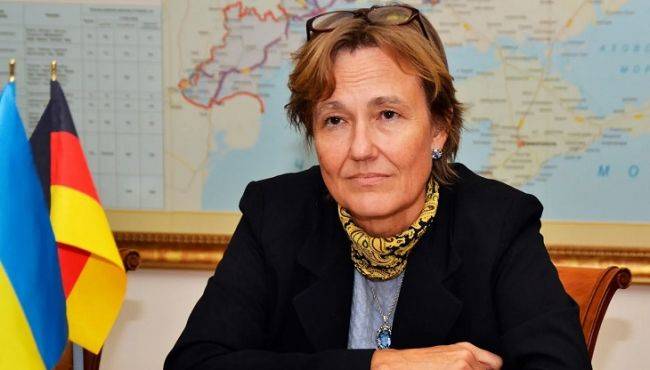
Anka Feldhusen
SOMETHING NEW AND BETTER MUST EMERGE FROM THE ASHES
1. The team of the Embassy of the Federal Republic of Germany in Kyiv and I, even when we were outside Ukraine for 10 weeks, never stopped supporting Ukraine and our bilateral relations. Since May 10, a small team of German diplomats has been in Kyiv again and, with our local staff who have remained here, we are experiencing the war together with the residents of Kyiv. We depend on water and power outages and spend a lot of time in bomb shelters. But, like all Ukrainian men and women, we also try to continue to live and work normally as much as possible and support Ukraine in its struggle against the Russian aggressor.
2. Germany has been supporting Ukraine in many areas since the beginning of the war in 2014, and, since February 24, it has also been helping with weapons. ‘Gepards’, PzH 2000 self-propelled howitzers, MARS II MLRS and, first and foremost, IRIS-T air defense systems play an important role in the fact that Ukraine can successfully defend itself against Russia. Also, our support in other areas, such as the restoration of energy infrastructure, reconstruction efforts in the liberated areas, accommodation of IDPs, as well as assistance in emergency situations, support for Ukraine’s agriculture and humanitarian aid, contribute to Ukraine’s stability and resilience.
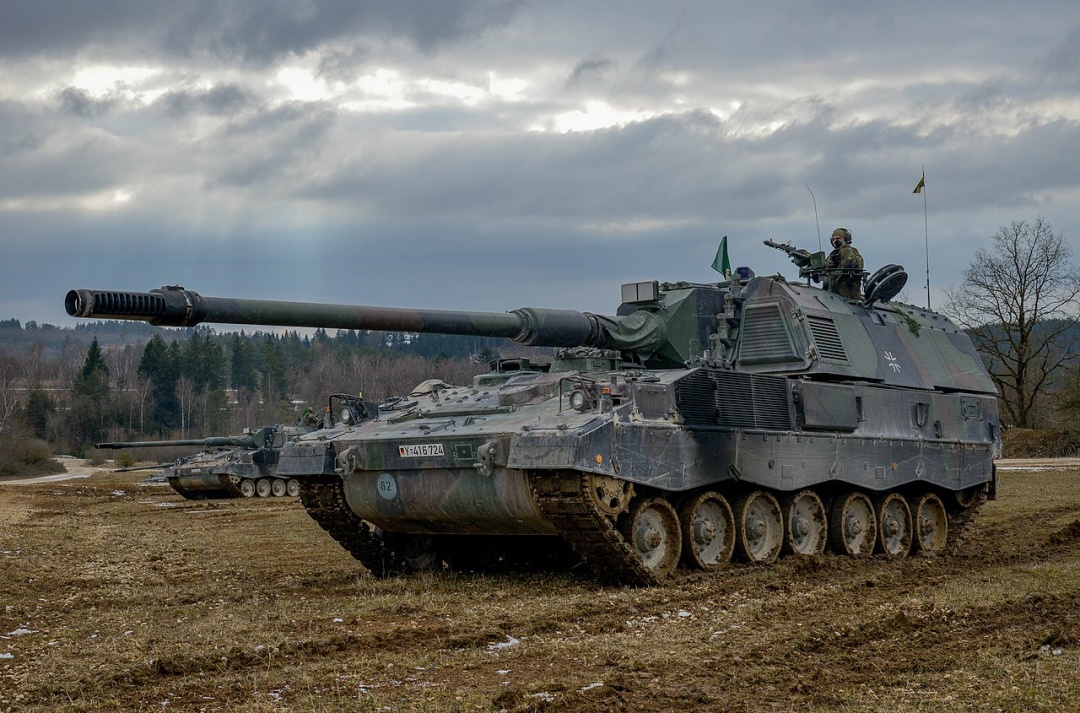
PzH 2000 / Photo: Nathanael Mercado
3. Cooperation in the military sphere, primarily the training of many Ukrainian soldiers in Germany, is a new and very important aspect of our cooperation. But, considering Russia’s massive missile and UAV attacks on energy infrastructure over the past two months, our energy cooperation is also of great importance: in the middle of winter, it is vital to provide support for the energy system.
The Federal Government is now making efforts at all levels to ensure the prompt delivery of replacement parts. But, we need to take a step further, not just to preserve or restore the system inherited from Soviet times. Something new and better must emerge from the ashes. More decentralized solutions based on renewable energy will help ensure power supply in Ukraine. In this case, the energy system will not be so vulnerable, when some nodes are hit. Meanwhile, greater energy efficiency in buildings and industrial production will reduce dependence on fossil fuels.
In order to achieve these goals, Germany has been supporting Ukraine with significant projects for many years. We will continue to develop relevant activities as part of the German-Ukrainian energy partnership.
Ambassador of Sweden to Ukraine Tobias Thyberg:
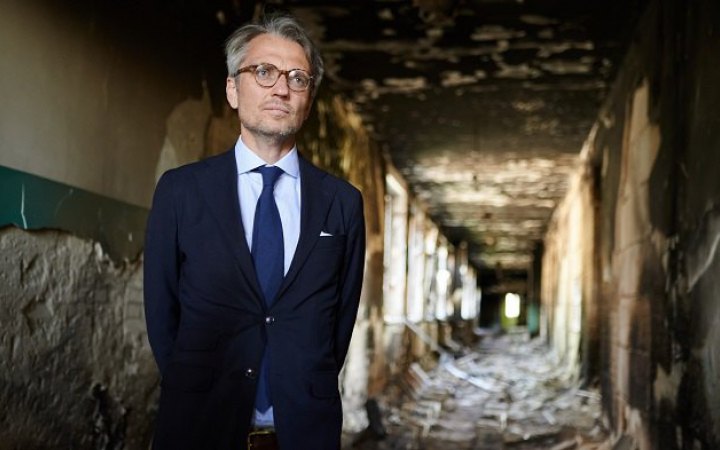
Photo: facebook.com/SwedeninUA
SWEDEN IS CONTINUALLY REVIEWING AND ENHANCING ITS SUPPORT
1. After temporarily relocation to Rzeszow in Poland when the war began, we returned to Kyiv on 2 May and have been here ever since. We continuously adapt our working conditions and preparedness as the Russian aggression develops. For instance: as the missile strikes on Kyiv have accelerated since October, we have strengthened our shelter, and as the supply of electricity and water has become shakier we have taken measures to increase the resilience of our energy and water supply,
2. At the current time the three most immediately urgent parts of Swedish assistance, in my view, are air defence, humanitarian assistance, and help to repair the energy system. These are the things that are most important in order for Ukraine to handle the effects of the Russian terror against Ukrainian civilians.
3. Sweden is continually reviewing and enhancing its financial, military and humanitarian support. Recently, Sweden provided its biggest military support package to date, and Sweden will continue to provide more military support. At the conference in Paris yesterday on Ukraine reconstruction, Sweden committed 600 million Swedish crowns to the World Bank for reconstruction needs. And our humanitarian support continues.
Ambassador of the Republic of Estonia to Ukraine Kaimo Kuusk:

THE BIGGEST CHALLENGE IS THAT NO ONE KNOWS THE PERFECT FORMULA TO ACHIEVE VICTORY OVER RUSSIA
1. This journey is not over yet so it’s hard to evaluate the way while you’re still moving. However, it’s not a fun adventure. This period was full of sirens, missile attacks, explosions, electricity cuts, and other things no one could imagine facing. We all have mixed feelings. These 300 days brought a lot of stress and uncertainty together with inspiration, hope, and invincibility. Our team consists of foreign diplomats and local employees, so our challenges differ sometimes. Probably, the most important thing is that we work as a team and go through all this together, being supportive and flexible to meet everyone’s needs. No one was left behind. Our team is focused on assisting Ukraine like never before. Victory of Ukraine is our common desire and priority. We’re determined to win.
2. Estonia provides all possible assistance to Ukraine – military and humanitarian aid, political support and advocacy on the international level, sharing our knowledge and expertise, close cooperation on Ukraine’s priorities in various areas, and training for military and civilian staff. And it’s probably not the full scope of our support. However, the most significant thing is timing. We appeared to be one of the fastest states to make serious decisions and fulfil our commitments. Amount of Javelins the anti-tank missiles we brought was not maybe the biggest, but it was here on the 18th of February so it played significant role in battle for Kyiv.
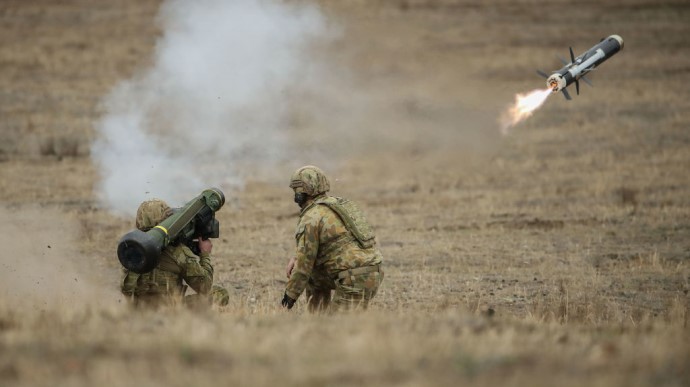
Photo: GETTY IMAGES
Another important and strong feature of our aid policy is teamwork. We consider all our allies as teammates and try to cooperate because we do believe that together we can bring more. Being at war, defending your country is an expensive thing, advocacy work takes much time and effort but when we’re united and work side by side, things start moving in a proper direction, to victory. After 300 days of war, we can confirm that it’s an efficient strategy.
3. The biggest challenge is that no one knows the perfect formula to achieve victory over Russia. Only when Ukraine wins and analyze all experience and steps taken, we will probably get some idea how it has been done. As a result, we should get a new security order in Europe and a toolbox to preserve world peace and maintain global peace and security. We are halfway there. We have to prevent the UN failing its primary purpose, as happened with the League of Nations during WWII. Either we like it or not but we’re inventors without a guideline that should find the way to victory. Ukraine together with its allies should just continue to push its agenda. Repel, explain, ask, negotiate, cooperate, succeed, repeat.
Ambassador of Japan to Ukraine Matsuda Kuninori:
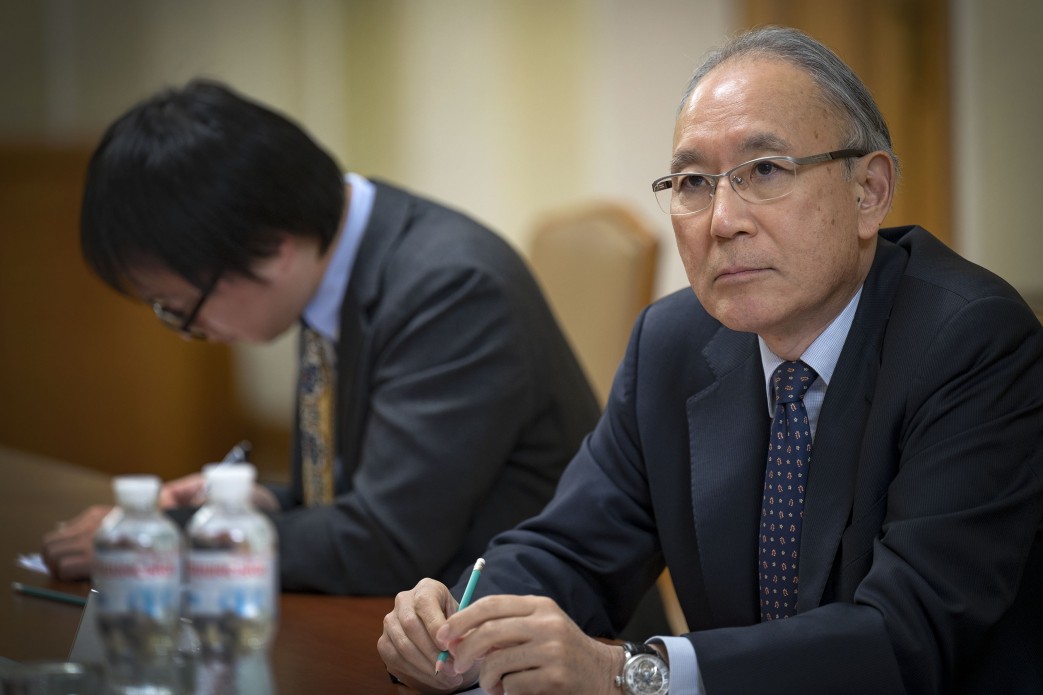
Photo: Office of the President of Ukraine
UKRAINE IS FIGHTING NOT ONLY FOR ITSELF, BUT ALSO TO PROTECT THE INTERNATIONAL ORDER BASED ON THE RULE OF LAW
1. In the early morning hours of February 24th when the Russian invasion of Ukraine began, I was at the residence of the Japanese ambassador. Then, until the temporary evacuation from Kyiv in early March, we were gathering information and assisting Japanese citizens with evacuation. Watching how President Zelensky, having stayed in Kyiv called for total resistance and how Ukrainians dealt with it calmly gave me great courage and hope.
During my subsequent temporary evacuation to Poland and also after my temporary return to Kyiv in the summer and the reopening of the Embassy in the fall, I and the embassy staff have always been with Ukraine and the Ukrainian people in our hearts. Now we are busy continuing coordination of humanitarian, financial and defense-related equipment’s support to Ukraine, acceptance of Ukrainian refugees in Japan and informing as many Japanese people as possible of the actual situation in Ukraine. Glory to Ukraine!
2. During the G7 Leaders’ Video Conference, which took place on December 13, Prime Minister Kishida stated that it is important for the G7 to stay united and support Ukraine in order to stop Russia's aggression as soon as possible. Taking over the G7 presidency next year, under the leadership of Prime Minister Kishida, Japan will cooperate even more closely with the international community, including the G7, and strongly promote sanctions against Russia and assistance to Ukraine.
Ukraine is fighting not only for itself, but also to protect the international order based on the rule of law. With regard to the food and energy problems caused by the Russian aggression, Japan and Ukraine can work together to support and appeal to the Global South, which has been particularly affected, but remains susceptible to the Russian false narratives. In this regard, we highly value Ukraine's "Grain from Ukraine" initiative. In November, the Government of Japan decided to allocate USD 14 million in emergency grant aid in order to ensure the transfer of wheat provided by the Ukrainian Government through the UN World Food Program to Somalia for its further on-site distribution, and this assistance is currently being implemented.
3. I believe that assistance supporting Ukraine's resilience is important. So far, Japan has announced and is now gradually implementing assistance worth around USD 1.1 billion, including humanitarian, financial and defense-related equipment’s support to the affected countries, namely Ukraine and its neighboring states. Japan also accepts and supports people who have been evacuated from Ukraine to third countries.
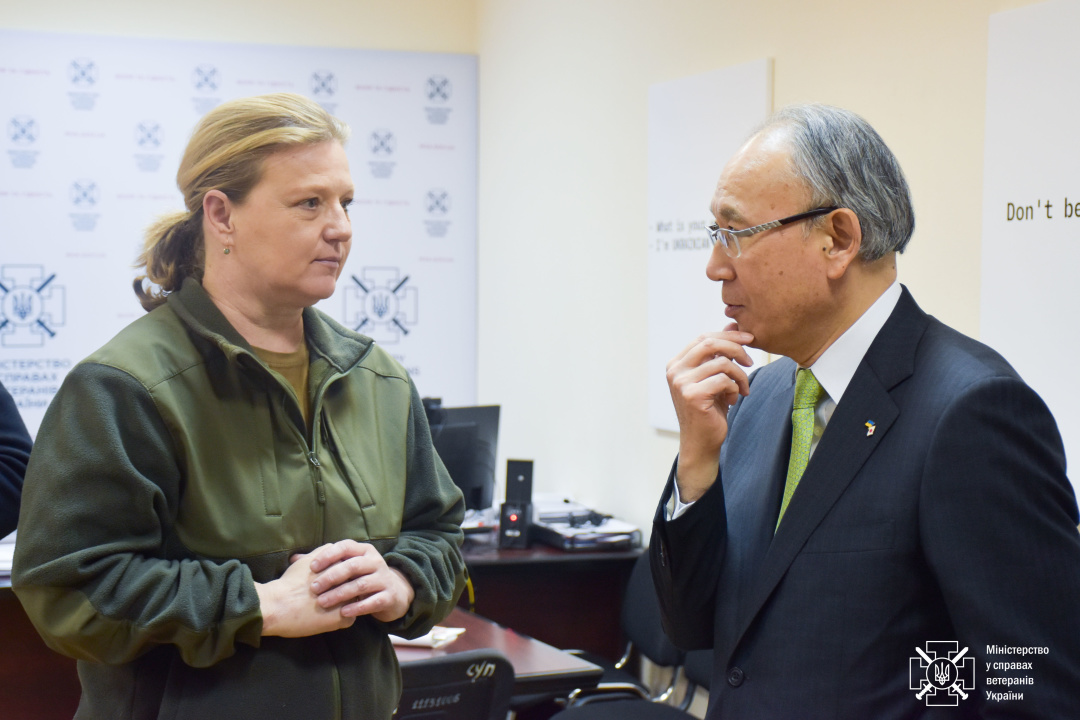
Furthermore, in order to help Ukraine persevere through a harsh winter, in November, it was decided to provide generators and solar lanterns as an emergency grant aid worth around USD 2.57 million, and they are currently being distributed. Moreover, on December 2, the Government of Japan allocated a supplementary budget of approximately USD 500 million to provide additional support, including further winterization assistance for Ukraine and its neighboring countries.
We reiterate our solidarity with the people of Ukraine, who continue to work hard to protect their homeland and families from Russian aggression, and we will continue to provide support to strengthen Ukraine’s resilience.
Nadiia Yurchenko, Kyiv

